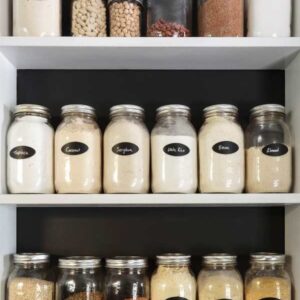We may earn money or products from the companies mentioned in this post.
To avoid falling into the trap of going hungry or spending too much on groceries, you need to learn how to stick to a budget at the grocery store. It’s not as hard as it sounds.
With the right tips and tricks, staying within your means at the supermarket is easy, especially if you stock up your pantry with staples ahead of time!
Here are some useful ways that will help you keep a tight rein on your finances when buying food.

Know your store’s layout
First of all, you need to know your store’s layout. Take a few minutes to explore the place and familiarize yourself with their inventory so you can quickly find what you need, without getting lost or wasting time trying to find the right place for your items.
Once you know where everything is, you can save time and money by not wasting time looking for things you need. You can also avoid impulse buys, which are rarely a good idea, by sticking to the items on your shopping list. You can also save money by not wasting time looking for things you need.
Track your meals and plan your grocery list
Keeping a journal like this of the meals you make and the ingredients you use is a great way to save money. By doing this, you’ll know exactly what you have in your cupboard and what you need to buy at the store.
You can also use this journal to plan out your grocery list. Keep in mind that fresh produce will go off quickly, so try to buy those items on the same day as when you make a meal that includes them.
Only buy what’s on your list
This one might seem obvious, but it’s also the most important tip: Only buy what’s on your list. You know what you need and what you don’t, so don’t let yourself be tempted by marketing gimmicks and impulse buys.
If you are not in the habit of making a shopping list before visiting the supermarket, you might get bored or hungry while you’re there. When you’re hungry or bored, you might let your impulses take over and buy things you don’t really need.
Try to buy in bulk and on sale
Whenever possible, try to buy items in bulk. This will save you money on the per-unit price of each item since you’ll be getting them in larger quantities like this oatmeal.
This will also allow you to make your money last longer so that you don’t have to make as many trips to the supermarket. If a certain type of food goes on sale, buy more of it and freeze it so that you have it on hand when you need it.
This will help you avoid having to buy those foods when they’re not on sale again. You might consider joining a bulk-buying club if there’s one in your area; this is a great way to save money!
Don’t shop when you’re hungry or tired
We’ve all heard the old saying, “You are what you eat,” but what most people don’t know is that you are also how you shop. That’s right, your shopping experience is affected by your hunger and fatigue levels. If you shop on an empty stomach, you’ll probably grab the first thing you see.
If you shop tired, you might not even remember what you bought once you get home. To avoid unnecessary spending, shop when you’re not hungry, well rested, and have a shopping list.
Check the unit price
This tip works best if you buy your food in bulk. If so, use a price checker app to see how much the item costs per pound. Once you know this information, you can buy that item when it’s on sale and use it to stretch your grocery budget even further.
For example, you may see that a bag of rice costs $4 and a bag of quinoa costs $6, but the quinoa bag only contains 6 pounds of food, while the rice bag holds 10 pounds. Even though the rice costs more per pound, the quinoa is a better deal.
Keep track of what you have and what you need
Knowing what you have by using a list like this and what you need is key to managing your food budget. That’s why you should keep track of everything that’s in your pantry, freezer, and refrigerator to ensure that you don’t run out of something important.
You can do this by keeping a notebook or spreadsheet of everything that’s in your fridge and cupboards, or you can use apps like FoodLog or Groceries to track your groceries and produce.
Conclusion
When you follow these tips, you’ll be able to keep a tight rein on your finances when buying food. This is especially important for people on a tight budget, since eating well doesn’t have to cost a lot of money. If you follow these tips, you’ll be able to keep a tight rein on your finances when buying food.
This is especially important for people on a tight budget, since eating well doesn’t have to cost a lot of money.




Leave a Reply